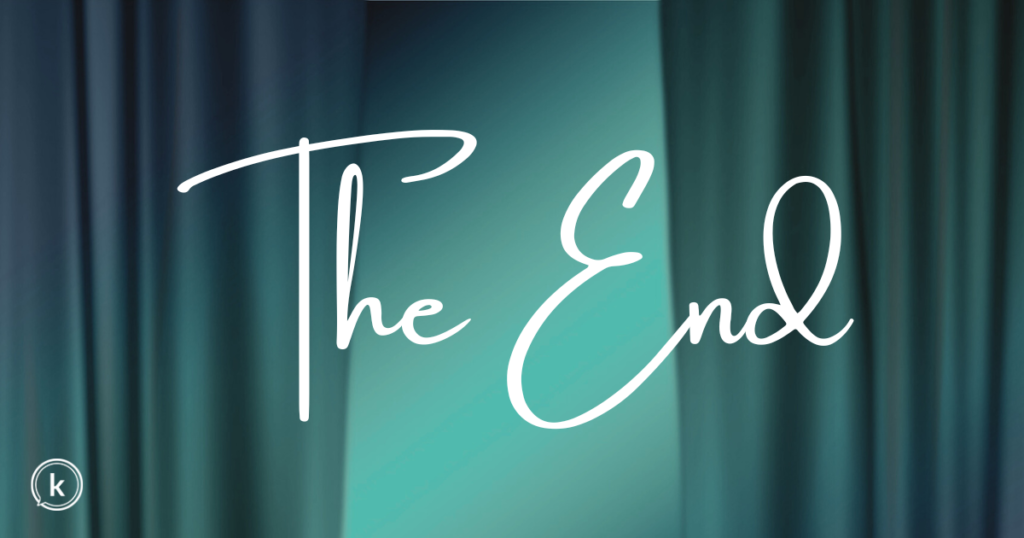Finishing strong: questions for fall self-reflection
I just can’t help myself.
It must be something about the season: hints of fall and kids returning to school always prompts introspection in me. (Even though my nest is empty, years of my own schooling and those of my kids have me conditioned!) I purposefully use this time of year as my second of two “life check-in” junctures.
I do my annual spiritual inventory, self-reflection and (personal and professional) goal-setting every January. In late August/early September, I check in on those items again, course-correcting for anything that’s gone awry and thinking carefully about how to best use the remainder of the year for God’s glory.
This year the exercise feels especially significant as I’ve relocated to a new state. That transition has, as you might expect, come with a significant amount of change (and a very quiet blog/newsletter—huge “thank you” to my subscribers for their patience!).
Here are the questions I’m asking myself; perhaps they’ll prompt something valuable in you, too, with which to forge ahead into the rest of the calendar year:
- With the growing seasons of spring and summer waning: How have I grown in recent months? What part of my life has God nourished especially (even if it’s different than I anticipated or hoped)?
- Fall is the time when many plants need pruning to weather the winter: What might God be asking me to let go of or cut back on for health and future growth?
- As school resumes for students: What is God teaching me right now about Himself? About myself?
- Fall will eventually give way to cool weather: Who around me needs to be drawn near for the warmth of fellowship? How can I fortify new and existing relationships against difficult seasons that might lie ahead?
When James wrote to the Jewish Christians scattered abroad, he reminded them how important it is to not merely hear the Word but to internalize it and live it out. He used the metaphor of a mirror: that God’s law provides us with a reflection that reveals to us the dirt on our faces (sin). To walk away from the mirror without choosing to wash off the filth (repentance, trusting in Jesus’ sacrifice), is utter foolishness.
For if you listen to the word and don’t obey, it is like glancing at your face in a mirror. You see yourself, walk away, and forget what you look like. But if you look carefully into the perfect law that sets you free, and if you do what it says and don’t forget what you heard, then God will bless you for doing it.
James 1:23–25 NLT
While this seasonal check-in doesn’t address our moral failings (that should happen daily!), the spirit of the exercise is the same: we may have “forgotten what we look like” somewhere along the way, so let’s return to the mirror to see what God is doing in our lives and how we can respond in faith.
How to dress for public speaking success
Whether they’re delivering a TEDx talk, speaking at a conference, or presenting to colleagues, many of my clients want to know how to dress for their big presentations. That’s a reasonable question. But today’s audiences rightly value authenticity over appearance, which begs a different question: does what we wear when presenting even matter?
My answer?
No.
Maybe.
And yes. (But not for the reason you’d think.)
The No: Why your attire doesn’t matter
Read MoreWhat we miss when we read the Bible alone
I’m a sucker for a good story.
I know you are, too. We can’t help it. God hardwired it into our brains. Functional MRIs show how our brains respond to stories (versus information)—more areas of the brain light up and with greater intensity. And even newer research has shown something fascinating: our heartbeats seem to synchronize when we hear a story at the same time, in a shared experience.
How. Cool. Is. That?!
While this is obviously relevant for my work with speakers in crafting their content, I think there’s a treasure here for followers of God, as well.
Read MoreHow (not) to end your presentation
Great stories deserve great endings.
We demand great endings from movies. We criticize them to no end when they don’t leave us with a sense of closure. Granted, some screenwriters strive to agitate their audiences with some form of an unforgettable cliffhanger (looking at you, Inception). But for the most part, the stories we love typically end with resolution that leaves us feeling satisfied. Even Sixth Sense, with its mind-bending conclusion, affords watchers some sense of restored world order.
Audiences need that same sense of resolution from our presentations. Yet too many speakers (founders, especially) abruptly arrive at their last slide and say “yeah, uh, I guess that’s it” or “any questions?”.
If Gone with the Wind or Indiana Jones and the Raiders of the Lost Ark had left off the way most presentations end, we wouldn’t still be talking about them decades after their release (at least not positively, anyway!).
While we’re not trying to win an Academy Award with our presentations, we do want them to be memorable. And that means adhering to a storytelling structure that includes an effective ending.
The psychological principle of recency underscores why this is so important: we remember best what we heard last. If the last thing your audience hears is an ambiguous, lackluster version of “the end” (which sounds a lot like “I’m out of slides”) then that’s what they’re going to remember. And that, my friends, is not the way to persuade or inspire anyone to do anything.
The saddest part is how easily this can be corrected.
Read MoreThree vital ways using our voices shapes our faith
As an introvert, whose nervous system goes into hyperarousal with too much stimuli from sound and light, I often opt for quiet, introspective, individual faith-building practices like reading or prayer. (This is also why welcoming my kids home for visits means I have to gird myself for the steady stream of music! But having them home is worth every loud minute.) I’ve been thinking a lot about voices of late as part of my work as a public speaking coach/consultant. As I’ve reflected, I’ve come to better appreciate how significant our voices are to growing in faith.
Three ways voices play an important role faith-development:
Read MoreHow to sound more confident when speaking and presenting
If giving a presentation or speech makes your knees knock and your stomach flip, you’re in good company. Feeling nervous when speaking in public is an extremely common challenge. Yet we don’t want our nerves to impede our ability to communicate… we want it to be easy for our audience to understand and act on our message. Even those who do feel comfortable speaking and presenting might not be signaling confidence with their speaking style. Since our stakeholders weigh the merit of our ideas partly based on how credible they find us, portraying confidence is vital to the success of our message.
There are a variety of physical and audible ways to develop and portray a greater sense of confidence when presenting. This article will focus on the latter: what our audiences hear in our voices. If you’re not sure whether you’re conveying confidence with your voice (or body), ask for feedback from some trusted sources and/or watch some video footage of a recent presentation you’ve given.
Ever wondered…
…why your voice sounds so different on a recording? When we hear ourselves talk real-time, we hear the sound waves through both bone conduction and air conduction. We hear others (or recordings of ourselves) only through air conduction.
If you’d like to sound more confident than you currently do, use the following tips to bolster the quality of your audible communication. These tools will help in all communication scenarios: one-on-one conversations, roundtable meetings, and in front of larger groups, whether virtual and in-person.
Read MoreHow to build (and maintain) friendship in an era of division
I could not relate to what she was saying. If I may be candid, I was even a bit turned off by what my friend was sharing with me. I felt the urge to disconnect rise up inside me: Well, I guess I know not to broach *this* topic again in the future.
And then there are the times when I’ve shared my thoughts and experiences with a friend only to have her expression reveal how surprised she was to uncover a difference where we’d previously seemed to share a sense of sameness. I’d wonder whether our friendship had a future; if our friendship had been built on common ground, would this quake bring its demise?
There have been similar instances in many of my friendships over the years. I used to think it meant I hadn’t found the “right” people to have in my life… that if I kept searching, I’d be able to surround myself with people whose perspectives always aligned with my own. On every topic.
I know, I know… it seems a bit naïve to me, too, when I see it written out in black and white.
And yet, I think—even if only subconsciously—it’s how most of us are interacting with the world. We allow our differences to drive us apart. And the result is a loneliness epidemic. There’s a good bit of research detailing this reality, some of which I’ve written about and referenced before. If the statistics tell even part of the story, about half of us are without even a single meaningful friendship. And while we can’t control all the reasons—and certainly will not lay blame at the feet of those who are ailing from a lack of friendship—there are things we can do differently for ourselves and for others.
Read MoreHow to know your audience (and why you should)
He just wanted to be done.
Kevin had spent weeks working on his presentation before working with me. I understood why he was anxious to wrap up the content development process and move on to crafting the deck and practicing delivering the presentation itself.
But it was imperative that we stop and think about his audience before moving forward.
Why it’s important to know and understand your audience for presentations—even ones you give often
Read MoreWhen you don’t know you’re sick (or somehow forgot)
Is there anything scarier than being sick and not knowing it?
Okay, there probably is. But I find the idea of an undetected illness terrifying. (Just me?)
If you’ve been following Jesus for any length of time, you’re undoubtedly familiar with our sinful nature being likened to an incurable disease that we’re all born with as descendants of Adam. When we trust in Jesus as our Savior we are “cured” through a righteousness transplant of sorts.
Related: New DNA in Jesus (an article I wrote for Our Daily Bread based on an amazing true story)
In Luke 5, Jesus rebuts the Pharisee’s criticism of His willingness to spend time with sinners saying “Those who are well have no need of a physician, but those who are sick. I have not come to call the righteous but sinners to repentance.” (Luke 5:31, 32 ESV)
At first reading, it appears Jesus is describing the gaggle of social outcasts sitting at Levi’s table as being “the sick.” Indeed, they were all spiritually sick and in need of a Savior. And, as the religious elite, the Pharisees knew it too—that’s why they questioned Jesus for associating with them.
While that description may be accurate, it’s not the entirety of what Jesus was communicating. In a poignant way, He was holding a mirror up to the Pharisees, reminding them of the truth contained in (what we call) the Old Testament, asking them to recognize their own spiritual sickness.
This passage should make us uncomfortable, friends. Not because we’ve spent time at Levi’s table as a sinner. We all have! Knowing that about ourselves is what enables us to receive Jesus’ gift as the unfathomable grace that it is.
It should make us uncomfortable because it asks us to see how we’re like the Pharisees.
The Pharisees knew they carried the gene that predisposes us to sin and separation from God—remember, they were the religious experts.
And yet they ended up with hearts far from God, prideful over their position in the Jewish social structures and distancing themselves from those they deemed unseemly. Somehow, it seems they’d forgotten they, too, were ill.
Read MoreHow To Goldilocks Your Presentation Preparation
In recent weeks, I had two clients describe their presentation preparation process to me. Each represented one end of what we’ll call the “preparation spectrum.”
The first said, “I’m a manuscript speaker,” meaning that she writes out her message verbatim and uses that manuscript as her notes the day of the presentation (or memorizes it as written).
The other summed up his preparation saying: “I just jot a sticky note with three points and take that up with me and start talking… it’s more authentic that way.”
While there are benefits to both approaches, each carries pitfalls, too. Here’s what to know and how to find the sweet spot of preparedness that sets you up to deliver with confidence while still connecting with the audience.
Read More









